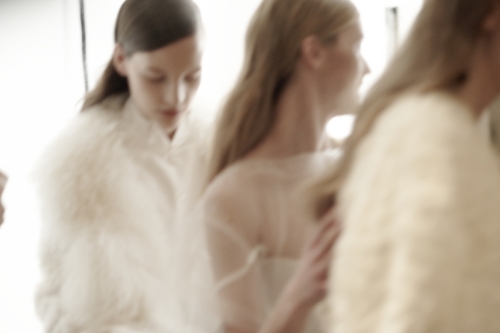Monday, July 23, 2012
Sunday, July 22, 2012
Friday, July 20, 2012
Wednesday, July 18, 2012
THIS IS NOT A MALL.
Image VIA http://www.broadsheet.com.au
Recently, whilst perusing Susie Lau's photographs on Style Bubble, I came across the ethical online fashion boutique 'This Is Not A Mall.'
Susie was wearing a vibrant pair of hand embroided NEON Hilltribe Platforms in one post that I lusted after straight away and I was very excited to discover they came from a shop that was concerned with both its social and environmental impact.
Melbourne expats Anissa Dove and Courtney DeWitt, now living in Bangkok, are the founders of TINAM. TINAM offers fashion and accessories from South East Asia and is committed to improving the livelihoods of women and children within the Kingdom of Thailand. Currently 15% of all profits are donated to aid Thai flood relief and impoverished Northern Thai Hilltribe communities. The girls are passionate about addressing the many social issues facing the region.
In a world where it is becoming increasingly difficult to know exactly where products come from, and whether or not a supply chain is ethical, TINAM aims to bridge the gap between the consumer and the maker by maintaining close involvement with those making the products and also by profiling these designers / labels on their website.
Even though the transaction is done online, it is surprisingly quite a personal experience - the girls at TINAM stay in close contact via email and update you on any progress made. The best part is they're open 24/7 and so you can continue browsing whilst waiting on the arrival of your purchase!
Below are the beautiful shoes I am waiting on... I am looking forward to strolling happily around Melbourne in them, knowing that they came from an ethical source and that they are walking ever so lightly on the environment.
It's really refreshing to find young Melbournians mixing fashion with ethics and doing so in such a new and exciting way.
To support them, click here.
To read an interview I did with the girls behind TINAM, click here.
Tuesday, July 17, 2012
Monday, July 16, 2012
MADE IN AUSTRALIA: THE POWER OF A LABEL.
Image VIA www.ifonlyflyingwassimple.tumblr.com
NOTE: This article was written for and published in Catalyst Magazine.
WORDS BY SIGRID (SIGGI) MCCARTHY.
WORDS BY SIGRID (SIGGI) MCCARTHY.
In light of changing global trends, the Australian textile,
clothing and footwear (TCF) industry is facing a moral dilemma. Many Australian companies are attempting to cut the
costs of manufacturing clothing domestically in order to remain competitive
against companies that take advantage of access to cheap labour offshore. The balancing act, for ethical
companies, is trying to compete in the ever-changing and competitive global
market, whilst also ensuring that the rights of workers are not compromised.
Like
many serious issues, the issue of outworkers’ rights has gained attention in
the media since the profit of many businesses has potentially been put at risk.
The recent passing of the Fair Work Amendment Bill on 22nd March
2012 has sparked much
discussion amongst industry based groups and individuals, and has highlighted
that outworkers are some of the most vulnerable workers in our country. Many outworkers have little knowledge of Australian systems and the English
language, which means they are often uneducated of their rights as Australian
workers and are not given the working conditions that they are entitled to.
The
highest numbers of outworkers are originally from Vietnam; however Eloise
Bishop from Ethical Clothing Australia (ECA) advises that ‘more outworkers from
African nations and the Middle East are being reported due to the higher rates
of refugees and those on assisted visas coming from these countries’. Working
from their homes and garages, outworkers make clothing for Australian
designers, fashion retailers, and uniform suppliers and we, as consumers are
blissfully unaware of the conditions under which this clothing is made. The sad
reality is that local outworkers often face extremely long work hours,
isolation, occupational health & safety issues, irregular flows of work, disruption
to family life, and powerlessness to speak out about issues due to fear of
losing work altogether.
In
an interview with Michele O’Neil, the National Secretary of TCFUA, Michele
stated that whilst the TCF industry has some really reputable companies in it,
some companies ‘go to extraordinary lengths to exploit workers and keep
workers’ conditions below legal minimum.’ Companies often distance themselves
from the exploitation of outworkers, arguing that it is the contractor’s
responsibility to ensure they are treated properly. Ultimately, if companies
are going to profit from their goods, they should not be able to distance
themselves from Australia’s laws and should ensure that these laws are being
met throughout the entire supply chain.
The
FairWear Campaign is a passionate network of Australian community members,
activists, and community organisations advocating for the rights of sweatshop
workers and home-based outworkers. They argue that by turning a blind eye to
what is happening in their supply chains, clothing companies are effectively
complicit in maintaining the power imbalance and exploitation within the
industry.
Ethical
Clothing Australia accredited brands are proving that companies can include
ethics in their business models and still produce aesthetically pleasing and
good quality clothing. The Australian brand ‘Nobody’ for example is amongst more
than 60 ECA accredited labels and actively promotes its brand as being
Australian made, fair and ethical. ECA accredited brands highlight that
regulation can in fact provide opportunities on a business level, as they appeal
to the increasing number of consumers that are conscious of buying ethical
products.
The
label on an item of clothing is very powerful in the sense that it dictates the
sizing of the garment, the material it is made out of, which country it comes
from and how much it costs. It could be argued that more detailed labelling
would potentially change the nature of clothes shopping and plant an ethical
seed in the consumer’s mind. RMIT University student, Mitchell Jenkins, supports
this notion by suggesting that it be 'made mandatory on a retail level for
Australian made garments to carry a detailing of their construction. That way, customers would be forced to apply ethics to the decision of purchase and
ignorance would no longer be the problem’. This was the sentiment behind ECA’s
“Meet Your Maker Campaign”, which was launched in October 2011 and aimed to
connect consumers with the makers behind the garments they purchase.
The
term ‘Made in Australia’ only indicates that the product has been made here in
Australia and more than 50% of the cost of making it has occurred here. This
does not indicate that those making the clothing here in Australia were treated
fairly, given the legal award rate and/or acceptable working conditions. With
this in mind, it is important for companies to be transparent and to openly
provide the conditions under which their clothing is made, as a lack of transparency is the
driving force behind potentially unethical consumption habits, not a lack of
compassion.
We as consumers have the power to change the nature of the
fashion industry, so before buying your next article of clothing, ask yourself
“Do I know who made this and whether this label is truly ethical?”
Sunday, July 15, 2012
REAL STREET STYLE.
As much as I love street style photographers and websites celebrating street style, I sometimes find myself thinking that they are too...put together.
I was kind of relieved to come across the work of Maya Villiger - a self-taught photographer originally from Switzerland - because her images felt more relatable and true to everyday life on the street.
Her work in 'Turned Out' is far removed from the sleekness and high resolution of many other street style blogs, where outfits are thoughtfully put together and people are more often than not wearing designer clothing.
There is a level of intimacy in her photographs that other street style photographers lack and instead of her subjects being all industry based, they are people from all walks of life.
All images by Maya Villiger VIA http://turnedout.tv
ANJA RUBIK STYLE.
VIA http://thebestfashionblog.com, http://lovewantbuy.tumblr.com, http://fashioninablink.com, http://carolinesmode.com, http://25.media.tumblr.com
Subscribe to:
Posts (Atom)




















































